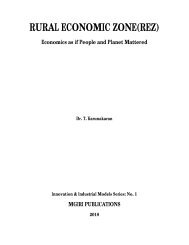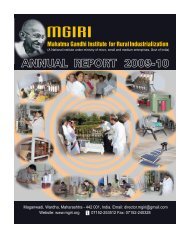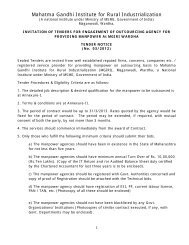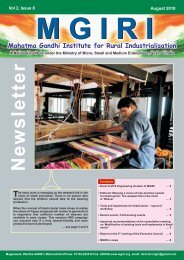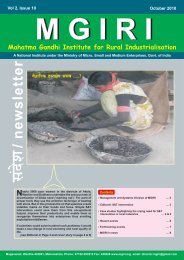NewsLetter Sep 2010 - Mahatma Gandhi Institute for Rural ...
NewsLetter Sep 2010 - Mahatma Gandhi Institute for Rural ...
NewsLetter Sep 2010 - Mahatma Gandhi Institute for Rural ...
Create successful ePaper yourself
Turn your PDF publications into a flip-book with our unique Google optimized e-Paper software.
Vol 2, Issue 9<strong>Sep</strong>tember <strong>2010</strong>M G I R I<strong>Mahatma</strong> <strong>Gandhi</strong> <strong>Institute</strong> <strong>for</strong> <strong>Rural</strong> IndustrialisationA National <strong>Institute</strong> under the Ministry of Micro, Small and Medium Enterprises, Govt. of IndiaNewsletterIt is important to strengthen the hands of ourartisans with the most scientifically designed toolsso that human ef<strong>for</strong>ts and material wastes areminimised. A quantum jump in productivity in craftand rural industries could be achieved by usingpower tools. Interestingly a large number of jobslike polishing, engraving etc. need very little powerand could be handled through solar power.Contents‹ Chemical Industries Division of MGIRI…. 2‹ Editorial – Power in the hands of artisans …. 3‹ Greeting the new Chairman of EC …. 3‹ Social entrepreneurship course <strong>for</strong> the youth ofGadchiroli …. 4th‹ 5 meeting of the General Council of MGIRI …. 5‹ MGIRI scientists bid farewell to Mr Dinesh Rai …. 5‹ Recent events / Forthcoming events …. 6‹ MGIRI will function as hub linking rural industries tonational institutions: The ‘MGIRI-Interfaces’ model …. 7‹ MGIRI in news …. 8Maganwadi, Wardha-442001, Maharashtra Phone: 07152-253512 Fax: 240328 www.mgiri.org email: director.mgiri@gmail.com
Chemical Industries Division of MGIRIObjectivesTo provide developmental guidance andsupport in the areas of chemical products andits manufacturing process <strong>for</strong> ruralentrepreneurs and to link frontier areas ofscience and technology to rural enterprises.To make the product / processes of ruralenterprises globally competitive throughinnovative organization of quality testing andquality guidance and to develop in-housetesting kits to assist the remotely located ruralindustries.To develop green technology andsustainable processes based on rural / agriresourcesand also enable the basic needslike drinking water af<strong>for</strong>dable to ruralpopulation, through an enterprise approach.Functionsi) Development of model enterprisesDevelopment of cost effective nonchemicalpreservation and packagingAtomic absorption spectrophotometermethods.Identification, extraction, separation andpurification of agrochemicals of potential use.Enterprises related to waste recycling through cleantechnologies (Clean Development Mechanism projects).Development of schemes <strong>for</strong> micro and small enterprise in thechemical area (with focus on industries dependent on ruralresources / market)Carrying out environmental impact assessment (EIA) related torural chemical industries.Scaling down of processes and plant designs suitable <strong>for</strong> microand small enterprises in the rural areas.ii ) Testing FacilitiesThe Chemical Industries division has a testing laboratory withadvanced instruments to help rural products and processes attainglobal standards.Major equipments like High Per<strong>for</strong>mance Liquid Chromatograph(HPLC), Gas Chromatograph (GC), Atomic AbsorptionSpectrophotometer (AAS), UV-Visible Spectrophotometer, HighPer<strong>for</strong>mance Thin Layer Chromatograph (HPTLC), Tintometer,Polarimeter, etc are available in the division.To provide authentic/credible testing services to our customers inthe national and export markets, the Quality Control Laboratories ofMGIRI are in the process of accreditation by the NationalAccreditation Board <strong>for</strong> Testing & Calibration Laboratories (NABL),New Delhi. It is hoped that by around January 2011, the laboratorieswill start their testing / accreditation services.Typical facilities includeTesting of food related products like food grains, cereal, pulses,spices, oils & fats, organic food, honey, processed food productsThe core scientific team of Chemical Industries division:High per<strong>for</strong>mance liquid chromatographGas chromatographUV / VIS spectrophotometerand water as per AGMARK/PFA/FPO/BIS.Testing facility <strong>for</strong> rural resource based chemical products suchas oils, soaps, detergents, shampoo and cosmetics.Determination of residual metals (in particular heavy metals) inpesticides, food flavors, essential oils, fats, sugars, vitamins,proteins, food preservatives, drugs, antibiotics, amino acids,organic acids etc.The division also undertakes testing of water and soil from the pointof view of toxicity.iii) TrainingThe division trains entrepreneurs and trainers in qualitymanagement. In select themes entrepreneurially important studentprojects requiring advanced facilities are also helped.iv) ConsultancyThe division provides consultancy in the areas mentioned earlierwith initial focus ondevelopment of new products / <strong>for</strong>mulations as per therequirement of the industryquality control guidance & establishment of in-houselaboratories <strong>for</strong> chemical manufacturing industriesdesign & development of effluent treatment plant.v) Policy and PlanningThe division also undertakes projects in<strong>for</strong>mulating the quality control strategies <strong>for</strong> ruralindustrialization,planning <strong>for</strong> setting up chemical industries in appropriate ruralregions.Suggesting government in devising implementation plan <strong>for</strong>the work.Dr Manoranjan PatnaikDy DirectorRegistration details:Hasmukhrai PatelPSOVikas ChoudharySSOSwanand KalambeTechnical AssistantAnil Kumar YadavSr. Lab. AssistantUma MagheswariSr. Lab. AssistantKalpana PantawaneLab. AssistantTitle: MGIRI Newsletter Editor: Dr T Karunakaran Printer: MGIRI, WardhaPeriodicity: Monthly Publisher: Dr T Karunakaran Nr.: MAHBIL 05736 / 13-1-2009-TCLanguage: English / Hindi Place of publication: Wardha Post Regn. Nr.: WDA / 60 / <strong>2010</strong>-12www.mgiri.org 2
Editorial: Power in thehands of artisansMGIRI welcomesMr Uday Kumar Varma, IASChairman of MGIRI’s Executive Council andVice-President of its General Councile were not only a land of many crafts but also theWland where artisans were viewed with reverenceand they had the protection of the community. Weconsidered it a virtue to buy from the artisan of ourneighbourhood even if the goods were a bit costlier.These sensitivities are slowly withering away asglobalization is making its inroads.Mr Dinesh Rai, the <strong>for</strong>mer Secretary of MSME whileaddressing the team of scientists from MGIRI on 19-8-<strong>2010</strong> at Nagpur said that almost all the 200 Hyderabadbasedindustries making hairpins have closed downbecause the Chinese-made hair-pins are available in themarket at a much lower price. Now whether it is the hairpinor the ‘rakhi’ thread used in Raksha-Bandan or theidols of deities like Krishna and Ganapati used in thegrand festivals of India the Chinese have succeeded insensing what the Indian buyer is looking <strong>for</strong>: Innovationalong with low cost!An Indian consumer has started asking the question: ifChina or Korea could make an item and sell it in Indiamuch cheaper after transporting it across the continentwhy can’t India do it at least at a reasonable cost? Is theconsumer being taken <strong>for</strong> a ride by the Indian industry?Unless we answer this question in a constructive waymany of our rural industries may have to pay a heavyprice. The worst affected will be the craftsmen. Are therecrucial directions in which swift actions could beinitiated?Yes. In providing our craftsmen and workers in ruralindustries with scientifically designed tools whose<strong>for</strong>ms and functions best fit the job situations resultingin improvement in quality and productivity andreduction in material waste, energy cost and productiontime.Powering the tools is yet another question. Since theentire country is not endowed with quality power supplythrough the grid decentralized energy has to beconsidered. In the case of hand tools we have twosituations. There are certain work situations that needtools of high wattage/ torque whereas there aresituations (e.g. polishing, engraving etc) where thepower needs will be small and could be easily met byportable solar powered hand tools.How about the portion of the work that needs higherlevels of energy? For example: in works involvingcutting, splitting, notching etc? Luckily we note that inmany cases the portion of the work demanding heavyduty tooling occupy only a fraction of the total workcycle. For example cutting the bamboo, splitting it andremoving the knots are preparatory works that could bedone in a Common Facility Centre (used through timesharing etc). Thus if such Common Facility Centrescould be made available along with powered tools incentral locations of the clusters the artisan canhave the works needing occasional heavy dutytooling done at the CFC (where energy and powertools are provided) andwork in his own hut or hamlet-based work-shed withsolar / other alternative power based hand tools.Thus there is indeed a chance of his productivity andquality becoming enhanced and cost reduced.The search <strong>for</strong> the best hand tool has to continue. Forexample if a low energy laser cutter could enable anartisan working on fabric or leather achieve greaterproductivity and better finish we cannot deny him itsbenefit. Similarly if a craft work demands imbedding ofan icon with an extraordinary high precision then it isunfair to demand the artisan to spend endless time inthe ‘copying’ act (because replicating an existingpattern doesn’t befit a creative artist). He might as welluse the modern techniques of ‘3 dimensionalprototyping’ or the benefit of a numerically controlledmachine which is made available as an advancedcentral facility. We have to provide level playing field toour artisans while displaying environmental sensitivity.Of course the swadeshi sentiment also is essential <strong>for</strong>the survival of our artisans and entrepreneurs since aresponsible globalisation is nothing but ‘globalswadeshi’ caring <strong>for</strong> the global co-existance ensuringthe survival of the local communities.– Editor3 MGIRI Newsletter : <strong>Sep</strong>tember <strong>2010</strong>
Social entrepreneurship course <strong>for</strong> Gadchiroli’s youthInspiration at Anandwan of Baba AmteBreathing the peacefull ambient of WardhaAt Maganwadi: Gramodyog museumDhara mitraMGIRI’s Bio-labCSV DattapurScientific way of dealing with rock-bee Herbal and panchgavya products Many products could be made out of <strong>for</strong>estCSV Wardha MGIRI Craft division Magan sangrahalayaProducts from handmade paper Attempting innovations in turnwood craft Understanding ‘cotton to garments’CSV KumarappapuramGlimpse of housing & sanitation at CSV Communication: learning English via drama The joy of a constructive vision: We can do !Development of Societal EntrepreneurshipMGIRI, with funding support from NCRI, Hyderabad has initiated an innovativeyouth programme called ‘Development of societal entrepreneurship’. 33 youthsfrom two of the most affected blocks of Gadchiroli district have been identified <strong>for</strong>training in societal entrepreneurship.The program was inaugurated on 10 August <strong>2010</strong> by Prof Desarda, <strong>for</strong>mer memberof Planning Commission, Govt of Maharashtra. Prof Desarda advised the youth toorganise the society so that it becomes free from exploitation. Dr Vibha Gupta,Chairperson – Magan Sangrahayala Samiti, Wardha encouraged the youth to walktheir entrepreneurial journey but with their destination as social entrepreneurship.The training programme uses totally new tools so that within a period of 3 months, the youth will be able to identify dreamprojects <strong>for</strong> themselves either individually or in small teams. To this extent the course is filled with extensive field visits.Internship with NGOs, hands down experiences, ‘face the entrepreneur session’ and a deep immersion into entrpreneurialcalculus assisted by computer techniques in business. The course has much space <strong>for</strong> self discovery.www.mgiri.org 4
th5 meeting of the General Council of MGIRIthhe 5 meeting of the General Council of MGIRITtook place on 25-8-<strong>2010</strong> at Udyog Bhawan, NewDelhi. Mr Dinsha Patel, Hon’ble Minister of MSMEand President of General Council of MGIRI chairedthe meeting. Mr Dinesh Rai Vice-President ofGeneral Council of MGIRI, Mr Saurabh Chandra,AS&FA and Mr Sesh Kumar Pulipaka, JointSecretary, ARI, Ministry of MSME attended asmembers. Representatives of the PlanningCommission, Department of Science & Technology,CAPART and ICAR were present.Professor Surendra Prasad,Director of IIT Delhi, Mr JS Mishra, Chief Executive Officer KVIC, Dr P L Dhar,Expert Member of KVIC, Mr Deepak Tyagi, Memberof Khadi Commission (Central Zone) besides Hon’ble Minister of MSME Shri Dinsha Patel and President ofeminent members from among the Khadi institutionsGeneral Council of MGIRI addressing its 5th meetingMr Devendrabhai Desai, Mr Chandrakant Patel, DrVibha Gupta, Mr Sardar Ravindra Singh and Mr K K Aron were also present.The primary purpose of the meeting was to confirm the amendment to the MoA and Byelaws that were approved during the4th meeting of the General Council on 17-12-2009. A few other vital issues related to land, building, budget and accounts ofMGIRI were also attended to. Besides approving the activity plan <strong>for</strong> <strong>2010</strong>-11 based on the ‘MGIRI grant’ approved by theParliament, the GC gave ‘in principle’ approval to therecommendation of the EC that funds <strong>for</strong> the‘Officer’s training hostel’ be re-sanctioned since thesanction made in October 2008 could not beimplemented due to certain administrative hurdles;similarly the GC approved funds necessary <strong>for</strong>purchase of vehicles <strong>for</strong> training and office purposes.The meeting endorsed the recommendations of theExecutive Council on the basis of the report by theInterface Advisory Committee (IAC) that 12 nationalinstitutions whose project based functions as‘MGIRI-Interfaces’ were thus far coordinated by theKVIC (in view of MGIRI being in its project phase) willhence<strong>for</strong>th be coordinated by MGIRI itself. Thephase-2 funding of interface project will be throughMGIRI and <strong>for</strong> this purpose appropriate budget will be made available by the Ministry of MSME. For managing the projectneeds of the current year <strong>2010</strong>-11 suitable arrangements will be made.MGIRI scientists bid farewell to Mr Dinesh Raihe scientists of MGIRI led by Dr T Karunakaran, Director, met MrTDinesh Rai, Secretary of MSME (who is also the Chairman ofExecutive Council of MGIRI) on 19-8-<strong>2010</strong> at Ravi Bhawan, Nagpur.Mr Dinesh Rai advised the scientists to focus on design of productsand systems relevant to micro and small industries. He took theexample of hair-pin industries of Hyderabad and said that with cheaperpins from neighbouring countries flooding the market most among thenearly 200 industries have had to down their shutters. A Task Forceunder the Prime Minister with the Secretary of MSME as convenor islooking into the innovation agenda. MGIRI has to become part of theinnovation network in a big way with the determination to contribute ina few select critical areas. Collaborating with global institutions oftechnologies may also be relevant <strong>for</strong> example the Czeck <strong>Institute</strong> ofTechnology.Mr Dinesh Rai, Secretary MSME being felicitatedby the Director and Scientists of MGIRIHe indicated that MSME touches the lives of the poor and unorganised while at the same time accounting <strong>for</strong> the economicprowess of the country. The sensitivity in the mind of a spiritually inclined scientist could help him emerge as the provider ofsolutions to the problems of poverty. After all spirituality is nothing but honesty, sensitivity and readiness to help the needy.5 MGIRI Newsletter : <strong>Sep</strong>tember <strong>2010</strong>
Recent EventsMGIRI team visiting the Plastic Park ofJain Irrigation Ltd on 10-8-<strong>2010</strong>MGIRI Team Interacting with the Chairman,Mr Bhavarlal Jain at Jalgoan on 11-8-<strong>2010</strong>Dr T Karunakaran interacting at ‘Anubhuti’of Jain Irrigation Ltd at Jalgoan on 11-8-10Mr K P Murthy, Former Advisor of MicoBosch discussing about powered handtools with MGIRI staff on 6-8-<strong>2010</strong>Mr Venkata Rao, DD Crafts (middle) withrural artisans on lacquer turnwood craft on20-8-<strong>2010</strong> at Selu Block, WardhaA programme <strong>for</strong> MIDC entrepreneursorganized by Laghu Udyog Bharati withthe help of MGIRI on 16-8-<strong>2010</strong>(Left) Dr APJ Abdul Kalam released the book ‘Perspectives on Nai Talim’ on 28-8-<strong>2010</strong> in<strong>Gandhi</strong> Darshan, Delhi. A major chapter of the book was by Dr T Karunakaran, who ispresenting a keynote on the said topic: Workable models of Nai Talim (Right)Forthcoming EventsScientists from the University ofBurmingham and University of Nottinghamat MGIRI on 16-8-<strong>2010</strong>Event Date(s) In Divn: Collab.Entrepreneurship training on ‘textile designs’ and ‘garment manufacturing’ 23 Aug–22 Oct NCRI, HyderabadEntrepreneurship training on LED 30 Aug–30<strong>Sep</strong>t Energy & InfrastructureEntrepreneurship training on use of web in marketing & business30 Aug–14 Oct Management & SystemsmanagementEntrepreneurship training on lacquer turn wood craft 30 Aug–30 Oct Craft & EngineeringEntrepreneurship training on photography & Photoshop 1 – 30 <strong>Sep</strong>t Craft & EngineeringTraining on ‘manufacturing of shampoo <strong>for</strong> SHGs & micro-enterprises’ 6 – 7 <strong>Sep</strong>t Chemical IndustriesPriority problems of KVIC needing S&T intervention: consultative session 9 <strong>Sep</strong>tember MGIRI and KVICinvolving senior officials of KVIC and the scientists of MGIRIEntrepreneurship training on Panchgavya herbal products, amino acid 13 <strong>Sep</strong>tember Bioprocessing & Herbalthrough waste recyclingDC (Handlooms) schemes <strong>for</strong> the benefit of traditional crafts and craftsmen 17 <strong>Sep</strong>tember C&E with DC (H) NagpurEntrepreneurship training on vermi-compost program on herbal and food 20 <strong>Sep</strong>tember Bioprocessing & HerbalWorkshop on ‘problems and prospects <strong>for</strong> chemical industries in Vidarbha’ 22 <strong>Sep</strong>tember Chemical IndustriesWS on auto-texture and design as per latest market trend (17 days) 4 Oct – 20 Oct Khadi & Textile with KVICTraining to KVIC artisans on CATD, jala, bandhini, tie and dye and latest 4 Oct – 3 Nov Khadi & Textile with KVIChandloom techniques* (1 month)KVIC artisans training on latest Muslin manufacturing technology under 4 October Khadi & Textile with KVICthe ‘Muslin Khadi’ project sponsored by KVICTraining on product development in horn craft <strong>for</strong> the SHGs 11 – 31 Oct C&E with Magan SangrahalayaNational level meeting on power tools in Bamboo craft (2 days) 22 – 23 Oct Energy &I with Craft & Engg.* Possible variations will be notified on the websitewww.mgiri.org6
MGIRI will function as hub linking rural industries to national institutions:The ‘MGIRI-Interfaces’ model1. MGIRI Interfaces: will basically be a network of 8. Interface Advisory Committee (IAC): An Advisoryadvanced technical and management institutions that Committee consisting of the following Members will guideagree to collaborate with MGIRI in the process of providing the management of MGIRI-Interface (including selection ofS&T intervention to the rural industries sector. These the interface institutions, policy and resource mobilization):institutions will normally compliment MGIRI’s resourcesand also help it to reach out to all the regions of India. The (a) Director of MGIRI – Convenorprocess of intervention will be through projects based on (b) A representative of the Ministry of MSME – Memberspecific rural industrial problems.(c) CEO of KVIC or his representative – Member2. Historically: ‘MGIRI-Interface’ network was created in On the suggestion of the Chairman, Executive Council in its2002 through the involvement of 12 institutions includingth5 meeting on 2-7-<strong>2010</strong> approved the name of Prof P LIISc Bangalore, 5 IITs, 3 NITs and 3 regional institutions. Butsince MGIRI was in the project stage the responsibility ofcoordinating the interfaces was discharged by the KVIC tillnow. Consequent on MGIRI starting its autonomousfunctioning, it will become the ‘hub’ as per original plans –thas per the decision of the 5 meeting of General Council on25-8-<strong>2010</strong> based on the recommendations of the 6thmeeting of the Executive Council.3. Role of MGIRI:- selection of institutions- holding and disbursing funds- maintaining a database of problems- coordination / monitoring and- dissemination of technologyDhar as the representative of the Ministry of MSME.In all the above MGIRI will give priority to the problems ofthe KVI sector.4. Fast-track mechanism <strong>for</strong> selection of projects: Thiswill include online proposals, e-mail based refereeing andfinal selection based on presentation. The definition ofR&D, the scope of the projects and current priorities will beproperly notified by Director, MGIRI with a view to selectutility-based projects.5. Interface institutions also to serve as a pool ofresource institutions: Willing interface institutionstogether would serve as a pool of resource institutionswhich could be called upon to provide, by way ofconsultancy, S&T inputs to rural industries, to solveproblems that are referred to them by MGIRI. These inputscould be in the <strong>for</strong>m of providing technical in<strong>for</strong>mation,minor technical consultations and R&D supports that couldbe of two weeks, two months or more than one yearduration respectively.6. Institutions that could join the interface network: Itwas decided that besides the categories of nationalinstitutions mentioned in section 2 interested institutionsfrom a few more categories could also be considered- <strong>for</strong>example CSIR labs, institutions under TIFAC REACH-CORE, UGC centres of excellence, national institutions ofspecialized technologies, professional institutions like IIM,NID, NIFT, reputed engineering colleges with commitmentsbesides institutions willing to partner on the basis ofprojects funded by themselves. Select renownedspecialists could also be considered as ‘one-maninstitutions’on very rare topics. Certain KVIC institutionscould serve as the ‘extended arm’ of MGIRI in its ef<strong>for</strong>ts ofoutreach.Hub and Spokes model wherein MGIRI as a hub is helped byTechnology Backup Institutions (‘interfaces’) and Specialists (S)Suggested definition of R&D projects of KVICAn ‘R&D project’ from the point of view of KVIC is aproject that has the potential to1. Modify one or more of the factors (i.e. materials,methods, machine, man power, money needmanagement) related to rural enterprises through S&Tintervention with a view to solve their present problems orenhance its profitability, market viability, or employmentpotential - either through hardware approach or softwareapproach.2. Inject innovation, quality or productivity into ruralenterprises to enhance their global competence.3. Provide products / processes / software that is more orless immediately usable in new directions of employmentfalling within the existing schemes or with a potential toinspire new schemes.4. Enable an existing innovation to move nearer to theenterprise stage.Note: Projects that deal with fundamental researchwithout any immediate potential of creation ofenterprises will be discouraged. If a project is such thatwith a few years of R&D ef<strong>for</strong>ts it has the potential toinfluence certain rural enterprise directions then theproposer has to mention such directions.7 MGIRI Newsletter : <strong>Sep</strong>tember <strong>2010</strong>
MAH BIL05736 / 13-1-2009-TCPostal Regn. Nr.: WDA/ 60/ <strong>2010</strong>-12MGIRI IN NEWSBOOK POSTPostal Regn. Nr.: WDA/ 60/ <strong>2010</strong>-12Start NowAn innovative step by MGIRI<strong>for</strong> boosting saleof rural products through itsON-LINE ADVERTISEMENT /MARKETING PORTALwww.ruralhaat.com• Want to expand your businessglobally?• Want to advertise your productsand increase your customerbase?• Want to explore new horizons<strong>for</strong> marketing?And all this without spending amoney on it. Then visit MGIRI’sPortal www.ruralhaat.comRegister yourself totally free andstart advertising now.Contact: Mrs Pragati Gokhale9822719618, 9423885811, 9881941766Edited and published by Dr T Karunakaran, Director, MGIRI, WardhaLayout and typesetting by Mr Arun ShankerTo____________________________________________________________If undelivered, please return to:MG <strong>Institute</strong> <strong>for</strong> <strong>Rural</strong> IndustrialisationMaganwadiWardha - 442 001, MaharashtraIndiawww.mgiri.org8




